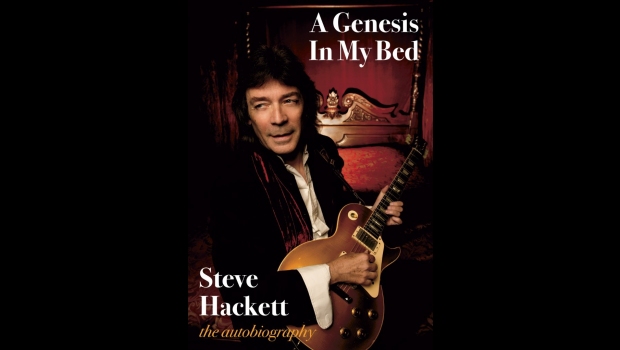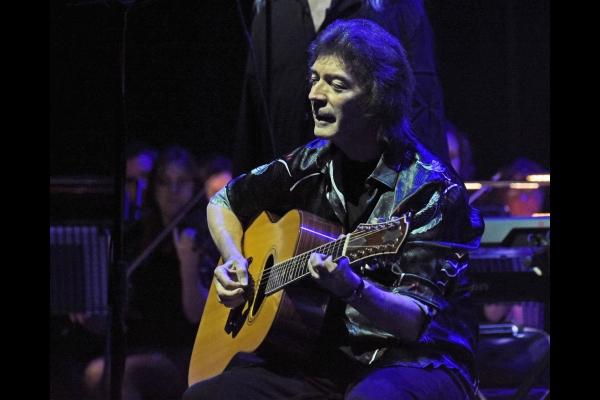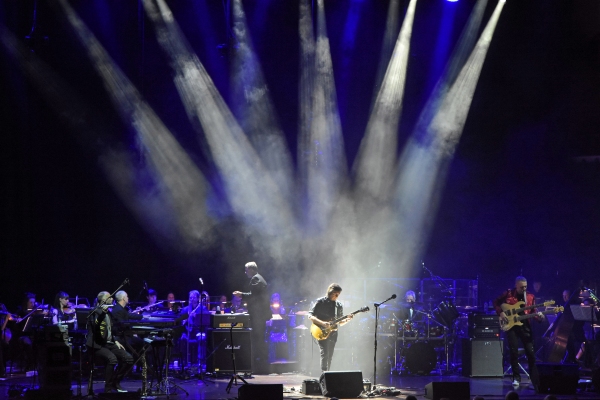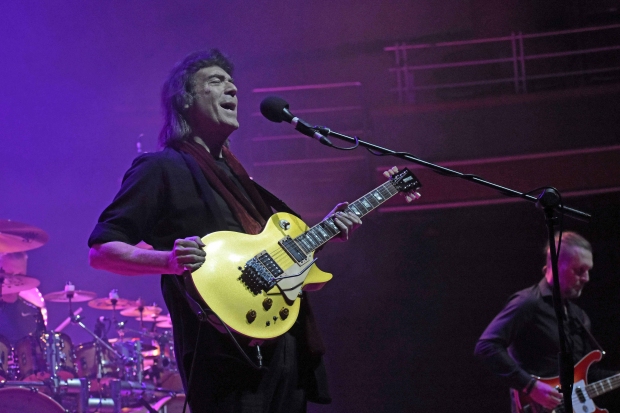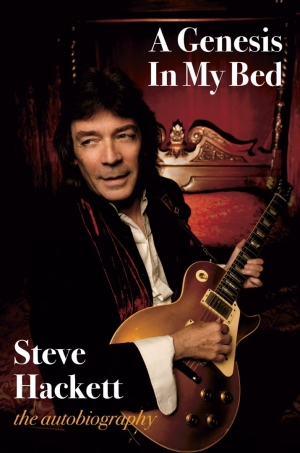A Genesis In My Bed, Steve Hackett Talks About His Long-Awaited Autobiography
Steve Hackett, legendary guitarist with Genesis through the classic albums of the seventies, and prolific solo artist for over 40 years, releases his long-awaited autobiography A Genesis In My Bed on 24th July 2020.
As with his music, Steve has written a highly detailed, entertaining and embracing tome that charts his life in full, but with a firm emphasis on his years with Genesis that saw the band’s meteoric rise to become one of the most successful British bands of all time.
Steve talks candidly about his early life, his time with Genesis, and in particular his personal relationships with the other four band members, with great insight into the daily goings on of this major rock band.
I caught up with Steve, recently, to talk about the book. He admits the book is long overdue and that, over the years, the book has changed. “It’s taken 15 years to write and it’s been extraordinary, really. I started writing this thing ages ago and then touring became hugely busy. I’ve just been doing so much touring and, because you’re doing so much touring, when we’re not touring we’re doing albums.
“First of all it was the chronology and trying to be informative and then there was anecdotes and things that had happened, trying to remember things that might amuse people, trying to have a certain amount of sex, drugs and rock and roll but, maybe, take it on a stage from that and take it into areas of geography, history, philosophy and those things that had no part whatsoever to play in a rock and roll biography. But, nevertheless, those are some of the more interesting things in my life so I’ve chosen to talk about those as well as ‘played here, went home, fell over, got drunk, woke up the next day, didn’t know where I was, got on the bus, went to the next gig.’”
Of course, there is lot of focus on Steve’s time with Genesis. Peter Gabriel responded to Steve’s advertisement in Melody Maker, which was full of self-confidence, quite a read!
“The funny thing is,” says Steve, “it was five years of ads and, when I first advertised, I just put ‘blues guitarist, harmonica player’. I got a couple of replies to that but a 16-year old white bluesman? The blues-boom was going to die by the end of the sixties for most of us. Music was to change and become far more interesting – I still love blues, I love the honesty of it – but, in terms of being able to inspire, music had begun to take on classical influences, a little bit like mini-operas, and I would include some of the early work of King Crimson, Epitaph, which was essentially a classical piece with rock drums.
“How does that work? It’s really a vehicle for the singer, for the message of the song, and I quite like the level of restraint on that, I think it’s fitting. That’s what progressive music was, at first, and then progressive stuff started to become more note-heavy. There was too much technique and not enough time writing the song. A good song is a bloody good thing and a lot of people forget that when they’re designing music to be heard.
“I like to think that any success is because of the song itself, although a certain amount is down to the singer’s hairstyle, but it’s also got to do with the song. The music’s got to be there.
“Genesis saw themselves as a semi-acoustic outfit, they were just as happy to have songs backed by 12-strings and with piano and there seemed to be a reluctance to expand and go loud. I thought ‘Hang on, we’re supposed to be a rock band! It’s precisely in the contrast between loud and soft bits that our future lies.’ So my take on it was perhaps a little different than the original insurgents.
“When I first met Phil Collins and spent an evening with him at home, he was playing me Buddy Rich with Mel Torme as the lead singer and I thought ‘Why does this guy like this stuff? What is it about it that works for him?’ I came to realise, over time, that it was the rhythmic changes and the whole swing era.
“I realised, with Tony (Banks) that it was about harmony and the changes that you might hear in classical music. He’d mentioned (Ottorino) Respighi and Shostakovic and I was only familiar with Respighi’s Fountains of Rome and then I heard other things by Respighi which were absolutely beautiful. I’ve recently been listening to some Shostakovic stuff which sounds extraordinary. Music that’s harmonically driven can be very subtle but that’s where the energy lies. You’re not really listening to classical music, too much, for it’s stunning rhythms, you’re listening for it to inform you harmonically, I think.
“Genesis were interested in hiring a guitarist who was prepared to sit down. Mike Rutherford said to me ‘We all sit down, Pete stands up and we only stand up for ‘the nice’, that was it, the encore! I said ‘Right-o!’” he laughs. “That was it and, even in The Knife, I had a guitar solo, it was an Anthony Phillips tune, it was driven by him which is why there is so much guitar on it, I thought it was a very good tune, very exciting and I revived it with my own band. We’ve done it in recent years and it had quite some punch.”
Steve is often quoted saying that Selling England by the Pound is his favourite album from his time with Genesis. It was a delight, therefore, to witness Steve and his touring band perform the album in its entirety during his UK tour last autumn. Watching the performance, with Steve centre-stage, reminded me just how many great guitar passages there are on that album, a matrix that held it all together.
“Yeah, there’s lots of guitar-glue in there. There are lots of moments where the guitar has been allowed to do its thing. It probably stands alone in the Genesis canon as the most guitar-driven album that the band were involved with. I don’t particularly make guitar-y albums, I don’t tend to think of myself in that way unless I’m doing an instrumental album, in which case, it’s full of nothing but guitar. I don’t think I’ve made a guitar-hero kind of album yet.
“It’s funny, people think there’s not a lot of guitar on Epping Forest, for instance. There’s masses of guitar work on that, although it’s rock guitar it’s pretty subtle and there are passages that get handed over to 12-string or a guitar that’s pretending to be a synth, an octave down, or guitar pretending to be stamping feet, to make those sorts of sounds. I was so concerned with detail and there wasn’t always a lot of room to come up with the traditional things for a lead guitar or a rhythm guitar so I did a lot of things coming in and out, punch things that would either mate up with the snare drum or play with repeat echo to provide backing for a section. But I think it’s the best guitar album although I realise, of course, that Foxtrot’s got Horizons on it. There’s guitar playing on all those albums but I didn’t always get the degree of space to move. Genesis had its own sort of lockdown and it didn’t always head towards the guitars.
“My relationship with them changed as I became more adept and the more I listened to them. I like to think that it was possible for them to listen to me but perhaps there was a reluctance. There is an aspect, trying to write as a song-writing collective… it’s a great idea on paper but in practice it means that he-who-shouts-loudest gets heard and so I was at my most effective when I was at my most vehement. I don’t think that he-who-shouts-loudest necessarily has the best ideas, but being in a group is like a constructive tug-of-war. There will be something, everyone is trying to get at the same piece of rope but not always for the rope’s benefit. There will be an outcome and it’s usually called a song, or a dispute, and people leave.
“Genesis started to haemorrhage band members and the rest is history. I feel I never really left the group, musically, but I left because I found its politics no longer workable and I needed autonomy. It’s so important to have autonomy if you’re going to write decent stuff on your own and if you’re going to work with other people and, if other people in the band start to object to your working with other people, then you’ve got to say ‘Am I being pensioned off here?’”
By the time Steve left Genesis, they had gone from the darlings of the college scene to global rock legends. Whilst Steve had created so many memorable passages within the Genesis catalogue, stepping out as a solo performer must have been a daunting prospect?
“I remember the first solo gig I did and I was extraordinarily nervous backstage, thinking my whole future depends on this one gig going well. If this gig goes well then we’re home and dry! And, luckily, the audience absolutely loved it and went nuts and I thought ‘You know what? If I can do it tonight I can do this again!’ I breathed a sigh of relief, went out and had a meal after the gig and I remember having a couple of glasses of wine and going ‘Yeah, I think we can do this. Audiences will like this, this is good, it’s not a coincidence, it’s not this guy was lucky to join Genesis, it’s more than that.’
“I proved it then, I proved it again with GTR and I’m still proving it all the time. Since then I’ve recorded with all sorts of people and all sorts of music including Bach and Eric Satie and various bits of classical things and I’ve surprised myself sticking my head in the lion’s mouth. There are so many different kinds of music that I love and I haven’t covered all of it, by any means.”
Our conversation, in April, came at the height of the pandemic lockdown. Steve had been forced to cut short his American tour and was now, like many others, working from home.
“We were in the States, half way through an American tour and we just had to accept that that was it, America was closing down and there wasn’t going to be any business. We got the last flight back from Philadelphia but, since we’ve been back, we’ve been busy doing videos and playing to camera with an i-pad. I don’t even have a functioning electric guitar at home, all my stuff was out on tour. I have an acoustic, or two, back home but I could never have imagined that I would need all of that stuff and not be able to access it from one day to the next. Our equipment has only just arrived back from the States. It came back by sea, rather than by air, which was more expensive but they just weren’t freighting stuff by air, as you can imagine because of the problems. We got the stuff back but the equipment itself is now in lockdown, no one really wants to touch it. Because nobody wants to… nobody wants to die.
“I’m staying busy, staying busy is the answer to not feeling locked down. One thing that is not locked down is the imagination. So, provided there is plenty of inspiration, it’s very productive.”
I suggested, perhaps that indicates a new double album by the end of the year?
“Yeah…” Steve tentatively agrees. “I’m making both a rock album and also an acoustic album – or I will be – it’s all on paper at the moment. By the end of next year I will have released a live album, probably an acoustic/orchestral album and a rock one, so three albums in the space of a year!
“Some call me slow, my engineer and cohort Roger King thinks I’m very slow. I think what he means is that the recording process is painfully slow because if I think there is a better take there, I’ll do it and I do tend to go back and re-record things if I don’t think they’re quite right, I can be really difficult to work with!
“I do have a studio upstairs, that’s really a music room but it’s a little tight in there. To be honest, we set stuff up in the living room, I tend to prefer to work in there where we have daylight and we just commandeer the room. We take it over for a good six months of the year and that’s the way it is. The priority has to be that in order to come up with the piece of product and the last one (2019’s At The Edge of Light), I think, was one of the best, and we did that in the living room.”
As a taster for Steve’s autobiography, here are some quotes taken from the book:
On joining Genesis…
He lifted his head and looked at me with a steely gaze… “You’ve heard of them, haven’t you?”
Once again I was up against that invisible wall, aware I could either choose to sit there and give in or climb over it. But once over the wall, you can never go back. I knew there and then I was about to take a leap of faith into that new world and that my life was about to change for good. I was to board a spaceship to a new planet with a bunch of aliens. I emptied my glass, put it down and walked out through the door into the sunshine, clutching that ticket to Mars.
On creating The Lamb Lies Down On Broadway…
We were writing and recording at high intensity. The Lamb is a dense album with tons of detail. Everyone brimming over with ideas, the record was as packed with themes as Times Square is filled with people on a busy night, vocals suddenly abrasive like the horn of a New York fire truck. Forget sweet dreams… the drama unfolds day and night.
The Lamb felt like a titanic adventure we were trying to survive… We struck icebergs, but bravely lurched on into shark infested, uncharted waters.
Had I done the right thing? It was a big risk and a huge step into the unknown. I was leaving a world class band that was by now filling arenas internationally. I had to trust in the power of my instinct and inspiration…
Anecdote about a border customs experience…
On one occasion, after customs found some residual illegal substance left by a previous band in the car we’d hired, we were taken off into separate rooms. The customs guys were confrontational and aggressive, challenging me with large dogs as I stood there without my clothes on. Then suddenly an alarm startled these jumpy characters who swiftly pulled out their guns and spun around wildly, nostrils flaring…
A Genesis gig caught up in a revolution…
The government was about to be overthrown the following day and it was like a tinderbox explosion! There was a riot outside the venue with guns and fire crackers going off and upturned army jeeps in the street. I heard there were fatalities. The gig was oversold. Pyramids of people clambering over each other we’re dangerously close to the balconies.
Steve Hackett’s autobiography A Genesis In My Bed (ISBN: 978-1-912782-38-3) is published by Wymer Publishing on 24th July 2020.
1,000 copies individually numbered and signed by Steve are available to pre-order directly from Wymer and Steve Hackett
LINKS
Steve Hackett – Website | Facebook | Twitter
All live photos by Geoff Ford

